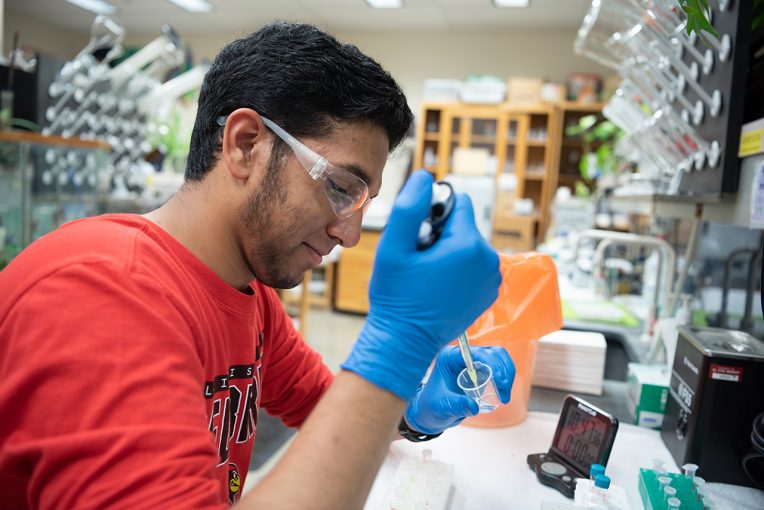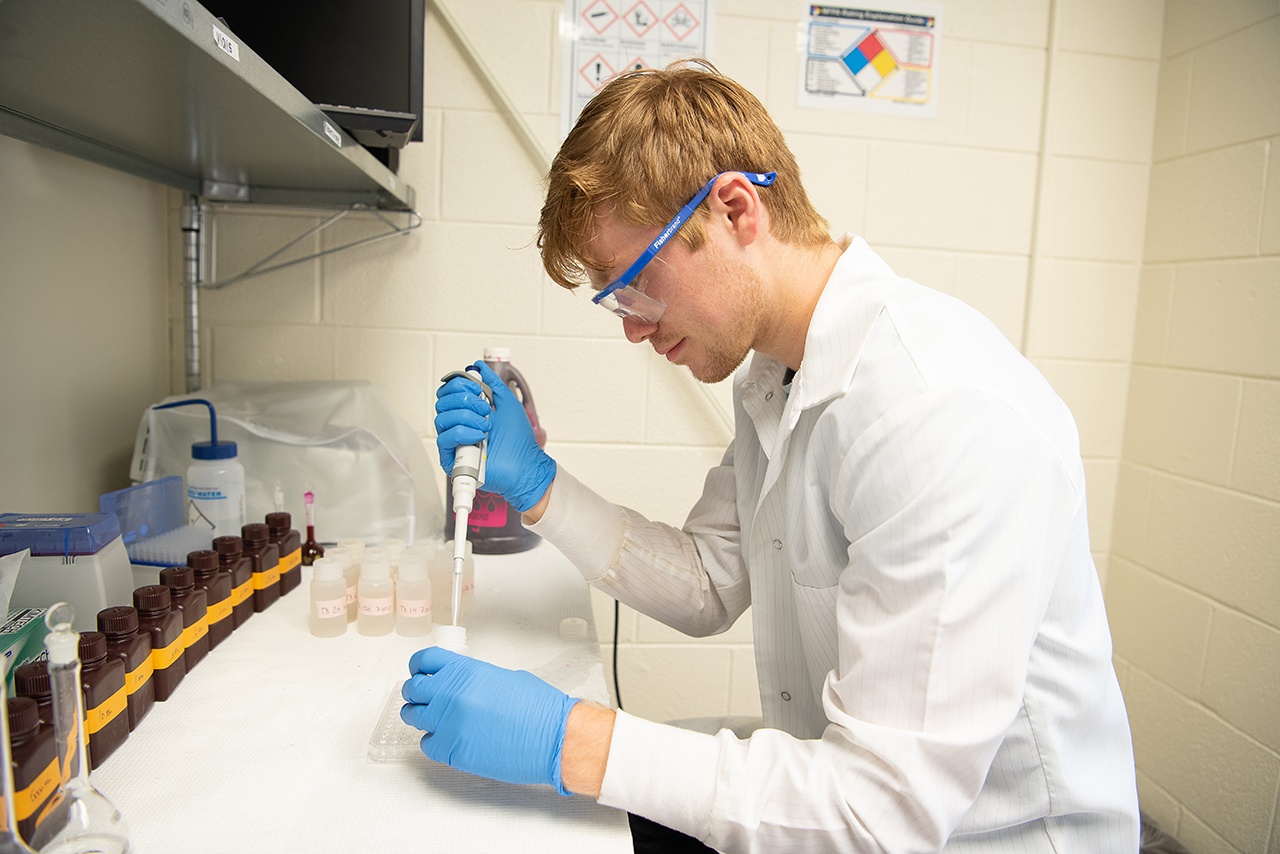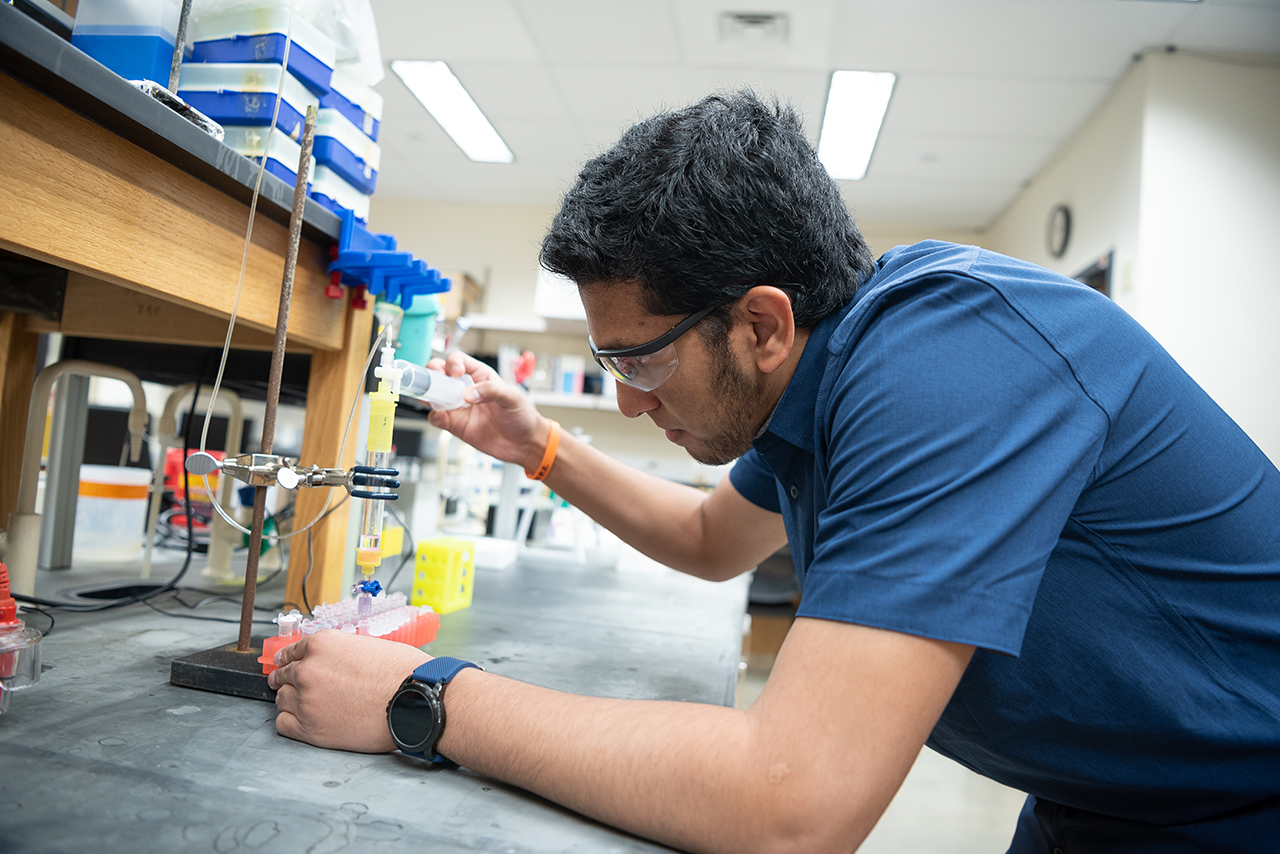A group of Illinois State student researchers was busy this summer.
Em Roden spent their summer studying two species of mosquitos collected from water-filled tree holes in a Central Illinois forest preserve. Twin brothers Faeq and Shariq Zaman put in dozens of hours in the Science Laboratory Building cloning genes and studying a flesh-eating disease, respectively. Joe Hoberg tracked how farm pollutants passed through groundwater that flows into the City of Bloomington’s water supply. And Catalina Hernandez-Ramos worked on creating a video game and a children’s book promoting the importance of conserving a biodiverse region of Panama.
These researchers were among 18 undergraduate students who received an Undergraduate Research Support Grant (URSG) from the Office of Student Research. The program, which is in its second year, pays students to focus on their research throughout the less hectic summer months.
“Students during the academic year don’t have the time to devote to an intense research experience with a faculty mentor,” Office of Student Research Director Dr. Gina Hunter. “This grant allows them to spend more intensive time with a research project. It’s a transformative experience for a lot of students because they can do research that will lead them to graduate school or into an internship, or it’ll give them a publication or two that they can use.”
The students received up to $5,000 they could use as a stipend and to purchase supplies and equipment. They also got the opportunity to work closely with a faculty mentor and more experienced graduate students. Hunter held professional development sessions throughout the summer for the grant recipients where they learned about goal setting and time management, research ethics, and how to communicate their research to the public.
This year’s projects originated from three of the University’s six colleges with more than half of the students majoring in the hard sciences such as biology, chemistry, or physics. Hunter would like to see more arts and humanities students participate in the grant program.
“The program has been really successful, but we want to encourage a greater number of more diverse students to apply. And so we are re-envisioning the program for the coming year.”
Here is a look at few of the students who participated in this summer’s grant program:
Catalina Hernandez-Ramos

Over the past couple of months, Catalina Hernandez-Ramos has been creating a video game and children’s book to bring attention to conservation efforts in a region of southern Panama. The senior creative technologies major from Chicago has been collaborating with Dr. Kristin Carlson, an associate professor in Illinois State’s Creative Technologies program, and anthropologist Lucy Gill, a Ph.D. student at the University of California, Berkeley, as part of a project co-sponsored by the Center for Civic Engagement.
“It’s about teaching others about conservation and just helping out the community in Darién, Panama,” Hernandez-Ramos said. “We’re using a game to help people understand the nature and the beautiful aesthetics of Panama. This area is a home to endemic species, and it should be treasured and preserved.”
Hernandez-Ramos has had to learn the 3D game design software Unity and apply her knowledge of computer coding to create the game. She is also making a children’s book about the region’s large wetlands.
She has had to be her own boss, learning to manage her time and set deadlines while working on a project she is passionate about. “My main goal is to help children see and understand that conservation is not only important in other parts of the world, but it’s really important in your own backyard as well.”
Joe Hoberg
Joe Hoberg, a junior geology major from Elgin, has been researching under the tutelage of University Professor of Geology Dr. Eric Peterson for a project co-sponsored by the Center for a Sustainable Water Future.
Hoberg traced the underground movement of water as part of a larger long-term study that began in 2015. Peterson and his student researchers have been working with the City of Bloomington at a site near one of its main water supplies, Evergreen Lake. The group is studying how to reduce the amount of farm fertilizer that travels in the groundwater and into bodies of water that feed into the lake and end up further downstream in the Gulf of Mexico.
“Normally this water infiltrates through the ground, gets collected in what are called tile drains, and they’re essentially an underground sewer system that takes it right to a stream,” Peterson said. “So any of the natural processes that would occur in soils don’t occur, and nutrients just enter into the stream. So what we’re interested in doing is redirecting the water back into the soil site. A diversion box has been installed that collects the tile water and then reintroduces it into the soil. But we don’t know how fast the water moves through and how long it stays in the soil before entering into the stream. That’s where the tracer test comes into play. Joe’s component is a critical point of the work. His work allows us to gain an understanding of how long it resides in the soil, and how the processes with the soil remove those nutrients.”
Hoberg plans to present his research at The Geological Society of America’s conference this fall. He said he has learned a lot doing this research, like how to calculate parameters for hydrogeology studies, how to manage his time, and how to deal with mistakes that will inevitably happen.
“This has just been extraordinary,” Hoberg said. “I’ve learned so much in the past six to seven weeks. It was really tough. There’s a lot of little things that you don’t know about research until you do it.”
Em Roden

Em Roden loves bugs. The senior biology major and environmental studies minor from Princeton, Illinois, has been spending a lot time with them, specifically two species of mosquitos, as part of a research project with Distinguished Professor of Ecology Dr. Steven Juliano.
Roden is examining the evolutionary relationship between parasites and their hosts, which can get interrupted when an invasive species is introduced into a new environment. More specifically, Roden has been investigating the impact the invasive mosquito species Aedes albopictus is having on the native mosquito Aedes triseriatus and a local parasite.
Roden was drawn to the research due to their interest in ecology and insects.
“When I was younger I didn’t understand how vastly complicated and interconnected nature was. (For example) a little insect going extinct could have had huge effects on the entire environment,” Roden said. “And that’s what I’m studying here. I’m studying population ecology, and I’m interested in insects as well. But I’ve always thought bugs were really interesting. I’ve described it before as, I can’t research aliens, so insects are the closest thing I can get.”
Juliano has helped Roden learn how research works. Roden has been collecting the native and invasive mosquitos at Merwin Nature Preserve, north of Normal, and then bringing them back to the laboratory to dissect and examine them to test the hypothesis that the invasive mosquito alters the relationship between the native mosquito and one of its parasites. The researchers explained that the competition from the invader may alter the native mosquito’s ability to support the parasite; alternatively, the invader may consume and remove the parasites from the water, diluting parasitism of the native. Roden plans to analyze their data and create a research presentation.
Roden said the research has prepared them for their career aspiration, which is to work for an organization that restores native prairie in the Midwest.
“Students tend to get caught up in the amount of things they know and can memorize. What is more useful is that I can take that knowledge that I’ve learned and critically think through it, analyze it, and use it,” Roden said. “And this research experiment is really helping me with that. It’s reinforcing the knowledge that I learned in school and building on it, and I think that will make me both a better graduate student and a better researcher and conservationist because there’s such a difference between learning that biological knowledge and actually using it.”
Faeq and Shariq Zaman
Illinois State sophomores Faeq and Shariq Zaman have a lot in common. The twin brothers from Normal both chose to follow in the footsteps of their brother Mohammed Zaman ’19 by studying at Illinois State. They both major in biochemistry, minor in biomedical sciences, and want to attend medical school one day. They also love scientific research and have been doing it since they left high school through the Honors Program.
This summer they shared space in the Science Laboratory Building where—and this is where their paths diverge—they worked on separate research projects.
Faeq spent his time studying an enzyme from the thermophilic organism S. islandicus thought to be critical in the biological pathway that forms cell membranes for a research project with Biochemistry Professor Dr. Jon Friesen. In order to obtain the protein, Faeq used laboratory safe strains of the bacteria E. coli as vehicles to clone the gene from S. islandicus that encodes for the enzyme and reproduces the protein. Faeq then isolated the protein from E. coli and is now performing several enzyme assays to learn what action the protein carries out and under which conditions it works best.
Shariq has been working with Biochemistry Professor Dr. Marjorie Jones and Assistant Professor of Organic Chemistry Dr. Jonathan Mills on a project concerning the structure-activity relationship of a unique group of organic compounds within the family of alkylphenols. Shariq’s research is on Leishmaniasis, a parasitic disease spread by sandflies that can damage internal organs and cause flesh-eating infections in humans. Shariq is testing whether Dr. Mills’ synthesized organic compounds, which have been effective against staph infections caused by MRSA, can also inhibit the Leishmania parasites in humans.
“With this grant, we’ve been able to apply what we learned in the classroom in a real-world setting,” Shariq said. “All the chemistry concepts that we’ve learned in the past year, including general chemistry and some basic biochemistry, actually come into use as we analyze our data and results in the lab. I found that very beneficial for our development.”
Faeq said the grant has helped him get a lot one-on-one mentoring but also has allowed him to learn how to work independently.
“You got to learn to be proactive and ask your own questions. You choose your variables, make your data table, and perform the experiment the way you want it to be run,” Faeq said. “In the beginning, I got a lot of guidance from Dr. Friesen, but now it’s like, ‘Hey I taught you how to do it, now you have to do it yourself and see if that solves the problem you are working on.'”
The deadline to apply for the Summer 2022 Undergraduate Research Support is February 1. Find out more about student research opportunities and grant funding by visiting the Office of Student Research’s website.



